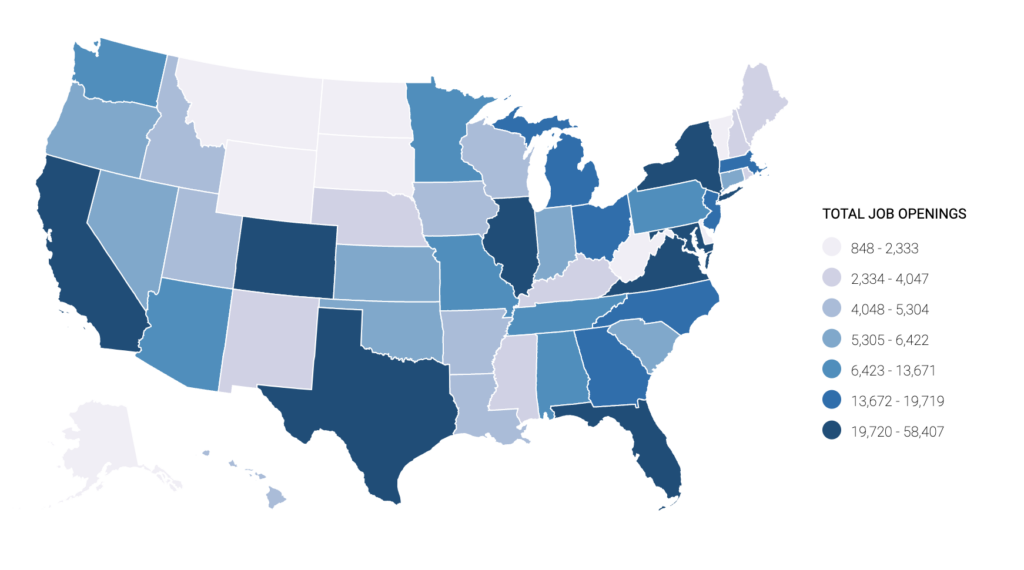What Does a Cybersecurity Engineer Do?

Thinking about a career in cybersecurity? Here’s everything you need to know about what a cybersecurity engineer does.
Technology permeates almost every aspect of modern life – payment systems, fitness trackers, baby monitors, smart fridges – it’s simply everywhere. As a result, the modern digital landscape is fraught with opportunities for bad actors to take advantage of tech meant to make life easier.
The ongoing threat of cyber attacks has led governments and private companies to employ increasingly sophisticated teams and techniques to secure their systems. But, in the field of cybersecurity, few roles are more central – or critical – than that of the Cybersecurity Engineer.
What Is A Cybersecurity Engineer?
Cybersecurity Engineers are IT professionals that assess, prepare for, and respond to cyber-attacks. They often directly recommend and oversee the tools and methods used to keep systems secure and stay ahead of new or emerging threats such as malware, ransomware, and hacking/intrusions.
With a diverse skillset and deep understanding of a company’s networks, Cybersecurity Engineers are often well-situated to work in any number of entry-level, mid-level, and senior security roles as their careers advance.
What Skills Does a Cybersecurity Engineer Need?
Security engineers must have a range of talents that address the most common and critical vulnerabilities a company may face.
Programming Langauges
Cybersecurity engineers are strong programmers in multiple languages and use them not only to evaluate or build the latest solutions but also to deconstruct the malicious codes and applications used to attack their systems. And because their efforts must fit the nature of their business, they need to be prepared to work in general-purpose languages like Python or C++, but also in languages specific to web or application work.
Penetration Testing
A cybersecurity engineer must be able to assess penetration testing and work with pen testers on new threats that have emerged in the industry.
Live Threat Management
They are critical stakeholders in real-time assessment, mitigation, and prevention of threats, as well as in live incident response and defense. They may also get pulled into troubleshooting everyday problems in the network and be asked to help drive broader company initiatives for a healthy network, such as change management, security audits, etc.
Strong Organization Skills
Critically, as members of a Security Operations Center (SOC) team, cybersecurity engineers are typically responsible for documenting and maintaining policies and procedures related to security concerns. This gives them a strong view of a network’s structure and defense, from the top down to the most granular level.
Hardware and Software Evaluation
They also need to be able to review new hardware and software options for ensuring network security and to understand specific threats their company may face from hackers.
Related reading: How To Become A Cybersecurity Engineer
What Is The Demand For Cybersecurity Engineers?
The Cybersecurity talent gap is well documented. There simply aren’t enough talented Cyber workers to fill available positions, with almost 580,000 job openings in the USA alone*. Demand is high, and growing – with the information sector projected to grow 32% over the next 8 years (which is much faster than average).

The prevalence of tech throughout everyday life is only expanding – each day bringing more products, services, and innovations. This, paired with the persistent headlines of cyber incidents affecting countries, companies, and individuals each news cycle, the Cybersecurity talent gap only promises to expand. This can mean only one thing for those interested in a Cybersecurity career: opportunity.
Cybersecurity Engineer Salaries
Overall, Cybersecurity professionals are paid quite well. According to ZipRecruiter, the average Cybersecurity Engineer makes $111,095* per year nationwide.

Further reading: How Much Do Cybersecurity Engineers Make Around the Country?
As you progress through a cyber career, salaries increase even further:
- Chief Security Architect: $177,571
- Lead Security Engineer: $122,890
- Chief Information Security Officer (CISO): $148,746
If the C-suite isn’t your idea of success, Cybersecurity engineers can also easily fit into alternative key focus areas. For example, they can use their knowledge of a firm’s networks to operate as a high-value penetration tester. They can also become a cybersecurity consultant, working with clients on a case-to-case basis.
Considering the high demand and the quality pay, the next question you’re likely to ask is “How to become a Cybersecurity Engineer?” Well then friend, keep reading.
How To Become A Cybersecurity Engineer
There are two main steps to becoming a Cybersecurity Engineer – acquiring skills and demonstrating those skills with a Certification.
Did you notice that “get a traditional 4-year college degree” wasn’t on the list?
More and more often, 4-year degrees are no longer a pre-requisite for entry-level Cybersecurity roles. While this is still an evolving trend, at the end of the day, the only thing companies truly care about is whether or not you have the skills to perform in a job.
We’ll cover the basics of the process below, but check out our blog “How To Become A Cybersecurity Engineer in 2024” for a more thorough overview.
Step 1: Acquire Skills
Cybersecurity Engineers generally have a mix of hard skills and soft skills. Their hard skills include various programming languages and a broad knowledge of networking, database platforms, and operating systems. Soft skills, though intangible, are just as important when it comes to working on a team – these can include top-notch communication, problem-solving, and a general willingness to learn and adapt to changing conditions.
While soft skills are developed over an entire lifetime and decades of a career, hard skills are easier to acquire in a short time – especially if attending an accelerated program like a Cybersecurity bootcamp.
Related reading: Are Cybersecurity Bootcamps Worth It?
Step 2: Earn Relevant Certifications
Cybersecurity Certifications generally achieve a similar purpose to earning a college degree – they demonstrate to prospective employers that you have the core hard skills required to succeed in the cybersecurity engineering space.
Examples of common certifications include:
- Security+ – a universally recognized certification on threat vulnerability and response; systems architecture; and governance, risk, and compliance.
- Certified Information System Security Professional (CISSP) – one of the most respected certifications in the field.
- Certified Ethical Hacker (CEH) – a crucial certification for those wanting to demonstrate thorough skills in penetration testing.
Related reading: 9 In-Demand Cybersecurity Certifications
See Yourself In Cybersecurity
Cybersecurity engineering promises to remain a critical and exciting career opportunity for the foreseeable future, and the ongoing talent job gap bodes well for those looking to transition to the field.
If you’re set on a career in Cyber, Apply Today to Flatiron School’s Cybersecurity Bootcamp – a program designed to have you industry-ready in as little as 15 weeks.
Not ready to commit? In the meantime, test-run what we teach in the course with our free Cybersecurity Prep – no strings attached!
*Job opening numbers and average salary cited 8 Jan 2024
Disclaimer: The information in this blog is current as of 11 January 2024. Current policies, offerings, procedures, and programs may differ.



